Sandoz expands partnership with World Child Cancer, to help children access treatment in four developing countries
- Expanded partnership to help “even the odds” of survival for children with cancer in the Philippines, Myanmar, Mexico and Ghana
- In developed countries, the survival rate for childhood cancer is 80%, while in developing countries it can be as low as 10%
- Sandoz is committed to working with key stakeholders to pioneer novel ways of expanding access to healthcare
Holzkirchen, July 25, 2017 – Sandoz today announces the expansion of a pilot project with leading charity World Child Cancer, aimed at improving access to treatment and optimizing survival outcomes for children suffering from cancer in four developing countries.
Jon Rosser, Chief Executive of World Child Cancer, said: “It is just unacceptable that children’s odds of surviving cancer depend so much on geography. In developed countries, 80% now survive, but in developing countries it’s still only about 10%. World Child Cancer is changing this – in our programs we can raise that survival rate to around 60%.”
He added: “We are very excited at this growing partnership with Sandoz, which will enable us to prevent so many children dying without even a diagnosis and without effective pain relief. We believe that all children, regardless of where they live, deserve better.”
The agreement builds on an existing partnership with World Child Cancer in the Philippines, where Sandoz is funding staff training needs and helping children to access diagnosis and subsequent treatment. It expands the partnership to cover three additional countries across three continents: Ghana, Mexico and Myanmar.
These particular projects were chosen because of the gravity of the situation in the four regions concerned: across all four, an estimated 6000 children develop cancer each year, but only approximately 20% even receive a diagnosis, let alone effective treatment.
Peter Stenico, Sandoz Head of Oncology, said: “These projects will take simple, pragmatic measures to attack cancer where it is most vulnerable: among children suffering from forms of cancer that are often absolutely treatable. Together with World Child Cancer, we believe we can make a real difference by enhancing the standard of care for children in these countries and, ultimately, improving childhood cancer survival rates.”
The expanded partnership highlights Sandoz’s commitment to work together with key stakeholders worldwide to expand access to healthcare. As a targeted philanthropy project, our work with World Child Cancer complements our broader Novartis Corporate Responsibility efforts across a number of lower income countries.
About Sandoz
Sandoz is a global leader in generic pharmaceuticals and biosimilars. As a division of the Novartis Group, our purpose is to discover new ways to improve and extend people’s lives. We contribute to society’s ability to support growing healthcare needs by pioneering novel approaches to help people around the world access high-quality medicine. Our portfolio of approximately 1000 molecules, covering all major therapeutic areas, accounted for 2016 sales of USD 10.1 billion. In 2016, our products reached well over 500 million patients and we aspire to reach one billion. Sandoz is headquartered in Holzkirchen, in Germany’s Greater Munich area.
Sandoz is on Twitter. Sign up to follow @Sandoz_global at http://twitter.com/Sandoz_Global.
Follow our blog at www.sandoz.com/makingaccesshappen
About World Child Cancer
World Child Cancer helps children with cancer access diagnosis, treatment and support in developing countries where the chances of survival can be as low as 10% compared with 80% in the developed world.
World Child Cancer does this by building partnerships between doctors and nurses at hospitals in the developed world who provide training and mentoring for doctors in developing countries. It also helps with transport, food and accommodation costs to meet the wider needs of families who have a child with cancer.
World Child Cancer programs run in some of the poorest places in the world. Last year it helped over 5,500 children but, with an estimated 200,000 unnecessary deaths each year, there is so much more that needs to be done.
Visit the World Child Cancer website at www.worldchildcancer.org, or follow World Child Cancer on social media at:
| @wchildcancer | |
| Facebook< | World Child Cancer |
| World Child Cancer | |
| YouTube | World Child Cancer |
| @wchildcancer |
# # #
| Eric Althoff Novartis Global Media Relations +41 61 324 7999 (direct) +41 79 593 4202 (mobile) eric.althoff@novartis.com |
|
| Chris Lewis Sandoz Global Communications +49 8924 476 1906 (direct) +49 174 244 9501 (mobile) chris.lewis@sandoz.com |
Duncan Cantor Sandoz Global Communications +49 8024 476 2497 (direct) +49 170 650 6067 (mobile) duncan.cantor@sandoz.com |
